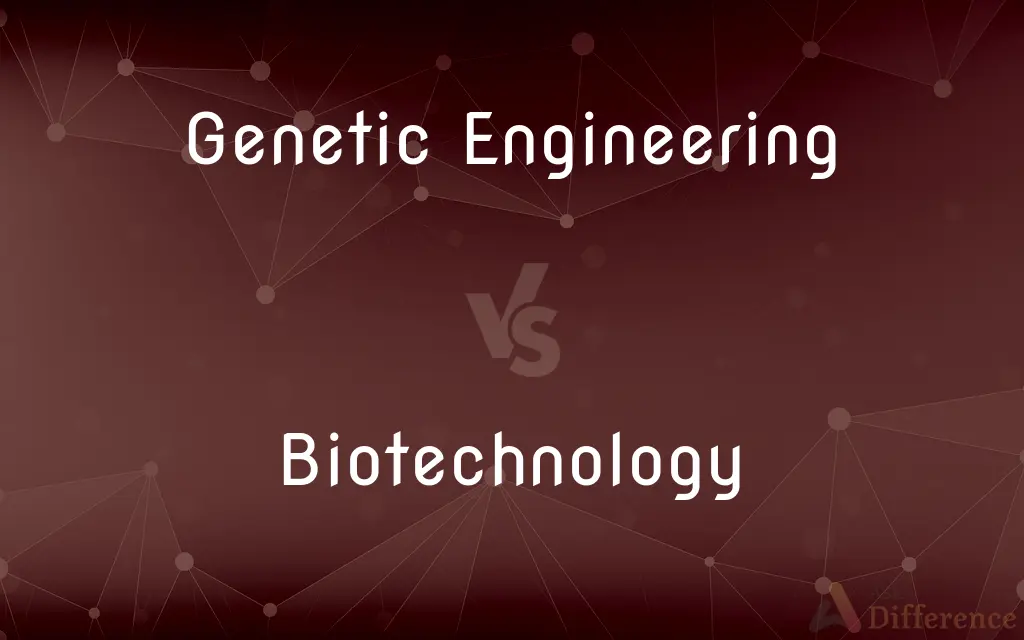Genetic Engineering vs. Biotechnology — What's the Difference?
By Maham Liaqat & Fiza Rafique — Published on November 12, 2024
Genetic Engineering focuses on altering organism's genes directly, while Biotechnology uses living organisms or their parts to develop products.

Difference Between Genetic Engineering and Biotechnology
Table of Contents
ADVERTISEMENT
Key Differences
Genetic Engineering is a specialized branch of science that involves directly manipulating an organism's genes using biotechnology. It is highly specific, targeting the alteration, removal, or addition of DNA sequences to achieve desired traits or outcomes. Biotechnology, on the other hand, is a broader field that encompasses the use of living organisms or their components to develop or make products for various purposes, including agriculture, food science, and medicine.
Genetic engineering is often seen as a modern extension of traditional breeding techniques, but with a much higher level of precision. It allows for the direct modification of the genetic material of an organism, bypassing the slow and less predictable outcomes of conventional breeding. Biotechnology, in contrast, has a longer history, dating back to the domestication of animals and cultivation of plants for agriculture. Its applications are vast and varied, ranging from the production of fermented foods like cheese and yogurt to the development of biofuels and biodegradable plastics.
Genetic engineering can introduce genes from entirely different species, a feat not possible with traditional breeding methods. Biotechnology not only includes the manipulation of genetic material but also utilizes whole organisms or their cellular and molecular components in industrial processes.
While genetic engineering is a focused application within the realm of biotechnology, aiming to modify specific traits of organisms, biotechnology itself is a wider field that applies biological principles to technology. It includes the use of microbial processes for waste management, the development of pharmaceuticals, and even the creation of synthetic biology where new organisms are designed to perform specific tasks.
Comparison Chart
Definition
Manipulation of organism’s genes directly.
Use of living organisms to develop or make products.
ADVERTISEMENT
Scope
Narrow, focuses on gene modification.
Broad, encompasses various biological applications.
Techniques
CRISPR, gene cloning, transgenesis.
Fermentation, PCR, cell culture.
Applications
GMOs, gene therapy, molecular medicine.
Food processing, biofuels, pharmaceuticals.
Goal
Alter specific traits or characteristics.
Develop products or processes for human use.
Compare with Definitions
Genetic Engineering
Modifies an organism's DNA to achieve desired traits.
Creating drought-resistant crops through gene editing.
Biotechnology
Utilizes living organisms for product development.
Using yeast for beer fermentation.
Genetic Engineering
Targets specific genes for modification.
Removing allergenic compounds from peanuts using CRISPR.
Biotechnology
Involves discussions on the use and regulation of biotech products.
Debating the labeling of genetically modified foods.
Genetic Engineering
Accelerates the development of modified organisms.
Fast-tracking the production of genetically modified mosquitoes to combat malaria.
Biotechnology
Has been practiced in forms like fermentation since ancient times.
The production of cheese using bacterial cultures.
Genetic Engineering
Enables the transfer of genes across different species.
Introducing a bacterial gene into plants to confer herbicide resistance.
Biotechnology
Offers solutions for environmental challenges.
Using microbes to clean up oil spills.
Genetic Engineering
Raises questions about long-term impacts and ethical considerations.
Debates over the morality and safety of creating genetically modified animals.
Biotechnology
Incorporates a variety of biological processes.
Employing enzymes in laundry detergents for stain removal.
Biotechnology
The branch of engineering science in which biological science is used to study the relation between workers and their environments
Biotechnology
The use of living organisms or biological processes for the purpose of developing useful agricultural, industrial, or medical products, especially by means of techniques, such as genetic engineering, that involve the modification of genes.
Biotechnology
The use of living organisms (especially microorganisms) in industrial, agricultural, medical and other technological applications.
Biotechnology
The application of the principles and practices of engineering and technology to the life sciences.
Biotechnology
The branch of molecular biology that studies the use of microorganisms to perform specific industrial processes;
Biotechnology produced genetically altered bacteria that solved the problem
Common Curiosities
How does genetic engineering differ from traditional breeding?
Genetic engineering modifies genes directly with precision, while traditional breeding involves selecting traits over generations.
What is genetic engineering?
Genetic engineering is the direct manipulation of an organism's genes using biotechnology.
Is genetic engineering ethical?
The ethics of genetic engineering are debated, with concerns about safety, environmental impact, and moral considerations.
What are some applications of biotechnology outside of genetic engineering?
These include the production of fermented foods, biofuels, and pharmaceuticals.
What are the risks of genetic engineering?
Risks include potential unintended effects on ecosystems and health concerns related to GMOs.
What are some applications of genetic engineering?
Applications include GMO crops, gene therapy, and the production of insulin.
What is biotechnology?
Biotechnology is the application of living organisms or their components to develop or make products.
Can genetic engineering be considered a part of biotechnology?
Yes, genetic engineering is a specialized tool within the broader field of biotechnology.
How has biotechnology impacted agriculture?
Biotechnology has improved crop yields, pest resistance, and food quality through both genetic engineering and traditional techniques.
What is the public perception of biotechnology and genetic engineering?
Public perception varies, with debates over safety, ethics, and sustainability.
What role does genetic engineering play in medicine?
It is used for developing treatments, such as gene therapy and personalized medicine.
Are there environmental benefits to biotechnology?
Yes, including bioremediation, sustainable biofuels, and reduced agricultural chemical use.
How is biotechnology regulated?
It varies by country but generally involves safety testing, environmental impact assessments, and ethical reviews.
How does genetic engineering affect biodiversity?
The impact on biodiversity is complex, with potential for both positive and negative effects depending on the application.
Can genetic engineering be used to combat climate change?
Yes, through the development of crops that require less water or can grow in harsher conditions.
Share Your Discovery

Previous Comparison
Deforestation vs. Logging
Next Comparison
Chartered Flights vs. Scheduled FlightsAuthor Spotlight
Written by
Maham LiaqatCo-written by
Fiza RafiqueFiza Rafique is a skilled content writer at AskDifference.com, where she meticulously refines and enhances written pieces. Drawing from her vast editorial expertise, Fiza ensures clarity, accuracy, and precision in every article. Passionate about language, she continually seeks to elevate the quality of content for readers worldwide.














































